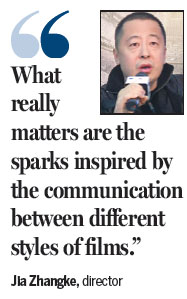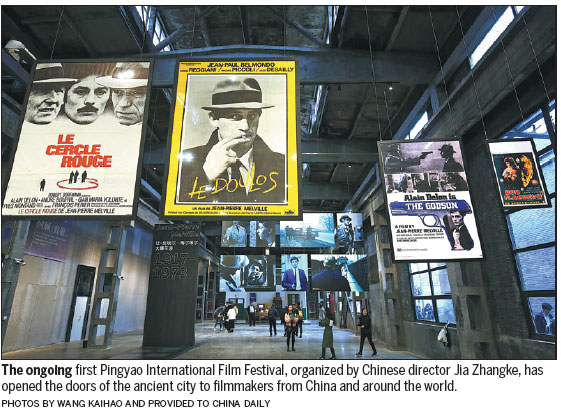Chinese director Jia Zhangke hopes his new film festival will be as much an attraction for tourists to Pingyao as the ancient heritage city. Wang Kaihao reports.
The onset of colder weather in late October usually marks the start of low season for tourism in the Shanxi heritage city of Pingyao, but a new film festival opening there has just changed all that.
Pingyao, China's best-preserved ancient walled city with architecture dating back to the Ming Dynasty (1368-1644), was designated a UNESCO World Heritage site in 1997.
The first Pingyao International Film Festival, organized by acclaimed Chinese director Jia Zhangke, has reignited a buzz in the city by throwing open its doors to filmmakers from all around China and the rest of the world.
In the festival, running from Oct 28 to Nov 4, Jia and his team have selected more than 40 new films from 18 countries and regions.
"More opportunities have been made available to young filmmakers," says Jia. "Creativity in young talent is the key."
Jia, 47, jokes that his mental age is 27, and it is this that helps him maintain his creativity.

With this in mind, Jia has created a segment at the festival dedicated to screening works by young filmmakers - with many of them making their international big screen debuts there. Jia has given the segment the title of "Crouching Tiger, Hidden Dragon," after Ang Lee's Academy Award-winning movie.
The director says strict standards were maintained during the selection process for entries to the festival, which were deliberately limited to a relatively small number.
Marco Mueller, Italian filmmaker and former artistic director of the Rome, Venice and Locarno film festivals, has been appointed artistic director for the ongoing event. He has been a longtime proponent of Chinese cinema in the international arena.
"We now have the first Chinese film festival with a dedicated resident artistic director, just like many of our top-tier international counterparts," Jia says.
To honor the birth centenary of Jean-Pierre Melville, a founder of the French New Wave movement, the festival will also host a special segment to screen 10 of his films.
Jia explains that Melville's films did well both commercially and in expressing his personal style, and could serve as a useful reference for Chinese filmmakers in today's market.
No awards will be handed out at the festival, which has been planned as an annual event.
"Competition is not a must for a top-tier film festival," Jia explains. "If it's overly emphasized, it can even prove a distraction for filmgoers."
Although he is often labeled as a leader of the Chinese arthouse movement, Jia wants to avoid using the event as a showcase to promote the genre.
"What really matters are the sparks inspired by the communication between different styles of films," he says.
"A professional operation is the foundation," he says. "I can't expect the Pingyao International Film Festival to compete with Cannes, but if we can persevere for five years, I think Pingyao can become the home turf for Chinese cinema."
Before making it as an A-list director, Jia was considered a maverick in Chinese cinema. Preferring to capture the lives of China's underprivileged, Jia was content to set up his camera on the dusty streets of China's small cities and counties. Initially neglected in the domestic market, Jia instead carved out a reputation for himself on the international film circuit.
In 2006, Still Life, a film about the Three Gorges Dam, earned him a Golden Lion from the Venice Film Festival.
"The first overseas film festival I attended was Berlin in 1998. That was also my first visit to Europe," he says. "I felt the strong cultural differences in what was a whole new world to me, and that experience inspired in me many new ideas," he says.
"Now, I hope overseas filmmakers can equally experience the cultural differences when they visit a small city in China with such well-preserved classical Eastern aesthetics."
Films from countries in Asia, South America and Eastern Europe dominate the screening list at the first Pingyao festival.
"Due to highly developed marketing channels, American and Western European films are easily accessible to Chinese filmgoers," Jia says. "However, the most dynamic creativity in the film industry is now in developing countries.
"Films in these regions more obviously reflect social change. Sadly, information about them is severely lacking."
Jia says he is not deliberately creating a force to counter the cultural influence of American film.
"At least we can have another type of movie to have an equal dialogue with them," he says.
Recently, Jia produced Where Has the Time Gone? - the first cinematic collaboration between filmmakers from all five BRICS countries (Brazil, Russia, India, China and South Africa) - which may be a motivation for Jia's desire to see fresh voices in world cinema.
As a native of Shanxi province, Jia's choice of Pingyao as the location for the festival appears to be a mark of respect for his homeland.
"I left Shanxi to live in Beijing in my 20s," he says nostalgically. "Shanxi has become very unfamiliar to me. I'd like to come back and search for my past."
However, Jia's home province has never been far from his heart. Shanxi has always been the preferred backdrop for his films, and the dialogue in his movies is often written entirely in the local dialect.
The main venue for the festival is the Pingyao Festival Palace, a recently refurbished machine factory which had previously lay abandoned for years.
"It was once the most ragged place within the ancient city walls," Jia says. "However, an international film festival may usher in more work opportunities and a more modern lifestyle here."
He confesses he faced many difficulties trying to organize such a big event in such a small place, far more so than if he had chosen a major city as the location for the festival.
"However, it's worthwhile to give a new image to the province," he says.
In China, Shanxi is often unfairly stereotyped as an old-fashioned central coal-producing province.
"As the film festival opens, you find drivers in Pingyao trying to speak Mandarin, and young people even speaking English," he says. "Changes are taking place."
Jia says the film palace will open its doors in January 2018, and will screen films otherwise overlooked by mainstream cinemas for commercial reasons.
"Who knows? Maybe movie-watching will become another tourist attraction for Pingyao other than visiting the heritage site within a few years," he says.
Contact the writer at wangkaihao@chinadaily.com.cn

(China Daily 11/02/2017 page19)